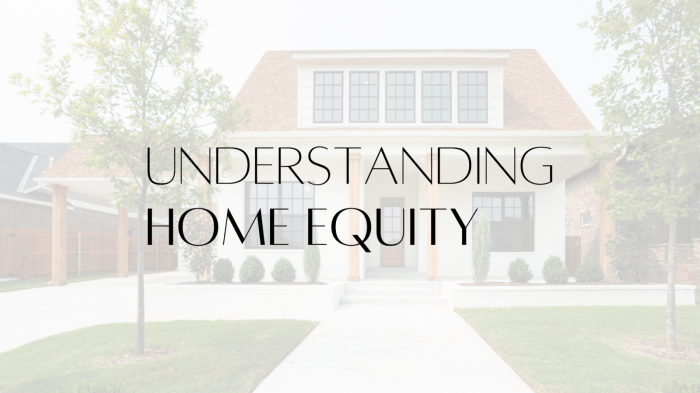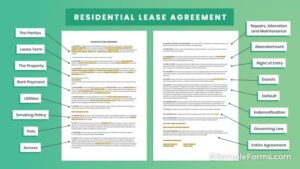
Ever thought your home could be a treasure chest? Well, welcome to the world of Home equity, where your abode isn’t just a comfy nest but potentially a goldmine waiting to be tapped! Imagine turning those four walls into funds without having to build a moat or hire a dragon.
Home equity represents the portion of your home that you truly own—like the cherry on top of a mortgage sundae! Understanding how to calculate it and its importance can empower you to make smarter financial decisions, whether you’re thinking of a renovation, consolidating debt, or planning for the future.
Home Equity Overview

Home equity is like finding a hidden treasure in your own backyard, but instead of gold coins, it’s your home’s value minus what you owe on it. Understanding this concept is crucial in navigating personal finance, as it can open doors to opportunities like loans, refinancing, and even dipping into your piggy bank for a much-needed vacation. Home equity is the difference between your home’s market value and the outstanding balance on your mortgage.
For instance, if your house is worth $300,000 and you owe $200,000, your home equity stands at a shiny $100,000. This equity can serve as a financial resource, allowing you to borrow against it for various purposes such as education, home renovations, or debt consolidation.
Methods to Calculate Home Equity
Calculating home equity can be straightforward, but there are a few key methods to ensure accuracy—because nobody wants to be that person who overestimates their treasure! Here are some methods to accurately assess your home equity:
- Market Value Assessment: Start by determining the current market value of your home. You can get a professional appraisal, or use online real estate platforms to gauge recent sales of similar homes in your neighborhood. Just remember, your home isn’t a magical castle, even if you think it is!
- Outstanding Mortgage Balance: Look at your latest mortgage statement to find out how much you owe. This is the number you need to subtract from your market value. Spoiler alert: it won’t be zero unless you’ve got more money than sense!
- Equity Calculation Formula: The formula to calculate home equity is simple:
Home Equity = Market Value – Outstanding Mortgage Balance
. Hurry, grab your calculators, and don’t forget to carry the one!
Common Misconceptions about Home Equity
Home equity is shrouded in myths that can leave homeowners feeling more confused than a cat in a dog park. Here are a few common misconceptions clarified:
- Home Equity Equals Cash: Many people think that home equity is cash in their pocket. However, it’s important to remember that equity is an asset, not liquid money unless you decide to take out a loan against it.
- Home Equity Always Increases: While home values typically rise, market fluctuations can lead to decreases in home equity. It’s not a magic carpet ride—sometimes you hit turbulence!
- All Equity Can Be Accessed: Homeowners might believe they can access all their equity at once. In reality, lenders often limit the percentage of equity you can borrow against, usually up to 80% of the total equity.
Understanding these aspects of home equity can empower you to make informed decisions and avoid pitfalls on your financial journey!
Home Equity Loans and Lines of Credit
When it comes to tapping into that glorious treasure chest known as your home equity, understanding the difference between a home equity loan and a home equity line of credit (HELOC) can feel like deciphering a secret code. Grab your favorite beverage and buckle up, because we’re diving into the financial funhouse of borrowing against the value of your home!Home equity loans and HELOCs are two common ways for homeowners to access their equity, but they’re as different as a cat and a toaster.
One offers a lump sum, while the other serves up a buffet of cash that you can nibble on over time. Let’s break it down so you can choose the right tool for your financial toolbox.
Differences Between Home Equity Loans and HELOC
Understanding the distinctions between these two borrowing options is crucial for making informed financial decisions. Here are the key differences:
- Home Equity Loan: This option is like winning the lottery but on a much smaller scale. You receive a lump sum of money based on your equity, and you pay it back in fixed monthly payments over a set term. Your interest rate is typically fixed, meaning no surprising spikes in your monthly payments.
- Home Equity Line of Credit (HELOC): Think of this as a credit card with your house as collateral. You have a credit limit based on your equity and can withdraw funds when you need them, paying interest only on the amount you borrow. The interest rates are often variable, which can feel like riding a roller coaster—exciting, but maybe a bit nerve-wracking.
Step-by-Step Guide to Applying for a Home Equity Loan
Applying for a home equity loan is akin to preparing for a big date; you want to put your best foot forward. Here’s a straightforward guide to help you through the process:
1. Check Your Credit Score
Your credit score is like your financial selfie—make sure it’s looking good! Aim for a score above 620 to increase your chances of approval and better rates.
2. Calculate Your Home Equity
Determine how much equity you have in your home. This is calculated by taking your home’s current market value and subtracting what you owe on your mortgage.
3. Gather Documentation
You’ll need to provide proof of income, tax returns, and details of your mortgage. Think of this as your “resume” for borrowing money.
4. Shop Around for Lenders
Not all lenders are created equal. Compare rates and terms from different banks and credit unions. The more you shop, the more likely you are to find a deal that makes you want to do a happy dance.
5. Submit Your Application
Once you’ve picked a lender, complete the application. Be prepared to share all the juicy details about your finances, just like spilling that embarrassing secret at a party.
6. Wait for Approval
After submission, your lender will conduct a thorough review, including an appraisal of your home. This is the part where you might nervously bite your nails.
7. Close the Loan
If approved, you’ll finalize the loan, and voila! You’ll receive your funds, and you can start spending them on whatever dreams you conjured up—like that flamingo pool float you’ve had your eye on.
Potential Risks and Benefits of Using Home Equity for Debt Consolidation
Using home equity for debt consolidation can be a double-edged sword. While it may sound as appealing as a slice of pizza at a party, it’s essential to consider both the risks and benefits.The benefits include:
- Lower Interest Rates: Home equity loans usually offer lower interest rates than credit cards, meaning more money stays in your pocket for that pizza party.
- Simplified Payments: Consolidating multiple debts into one home equity loan means easier management and fewer monthly payments to juggle—no more financial circus acts!
However, the risks are just as noteworthy:
- Risk of Foreclosure: Failing to repay your home equity loan can put your home at risk. It’s like lending your friend your favorite shirt and hoping they don’t stretch it out—serious business.
- Variable Rates with HELOC: If you choose a HELOC, be aware that interest rates can fluctuate, leading to higher payments. It’s like having a pet chameleon that changes colors—exciting but unpredictable.
Tapping into your home equity can be a fantastic financial strategy when done wisely. Just remember to weigh the pros and cons, and keep your financial health in check—after all, that’s the real treasure!
Home Equity in Financial Planning

Home equity is more than just a number on your home appraisal; it’s a strategic tool that can significantly influence your financial future. Think of it as your home’s hidden superhero cape, ready to swoop in and save the day when financial planning gets tough. Understanding how to leverage this asset properly can not only ease the financial burdens of today but also shape the legacy you leave behind tomorrow.
Impact of Home Equity on Estate Planning
When it comes to estate planning, home equity can play a pivotal role in ensuring your assets are distributed according to your wishes. Evaluating your home equity is essential for effective wealth transfer, as it can affect inheritance tax liabilities and the overall value of your estate. A well-crafted estate plan should take into account the following elements of home equity:
- Value Assessment: Regular appraisal of your home is critical to understanding the true value of your estate and the equity you hold. A rising market can significantly increase this value, enhancing your estate’s worth.
- Debt Consideration: Any outstanding mortgage or liens against your home must be factored in when assessing net estate value. Remember, you can’t leave what you don’t own!
- Asset Distribution: How will your home equity be divided among heirs? This is especially pertinent if you have multiple heirs, as some may want the home while others prefer cash. It’s a potential arena for family drama worthy of a soap opera!
- Tax Implications: Understanding capital gains tax and how it applies to your home can save your heirs from unexpected financial surprises. Knowledge is power—don’t let Uncle Sam’s hand sneak in where it doesn’t belong!
Comparative Analysis of Home Equity Financing and Other Financing Options
Home equity financing stands tall among the financing options available, often outshining personal loans and credit cards. While all three can help you access cash, they each come with their own quirks and characteristics. Here’s a breakdown of how they stack up against each other:
| Financing Option | Interest Rates | Loan Terms | Access to Funds | Risk |
|---|---|---|---|---|
| Home Equity Loans/Lines of Credit | Generally lower | 10-30 years | Based on home equity | Risk of losing home |
| Personal Loans | Higher than home equity | 3-7 years | Fixed amount based on credit | No collateral required |
| Credit Cards | Highest rates | Revolving | Available credit limit | Potential for debt spiral |
The best option for you will largely depend on your financial situation and goals. Home equity financing can often provide the most favorable terms, but it’s essential to remember that with great power comes great responsibility. Don’t forget, your home is not just your castle; it’s also a powerful financial asset that needs to be handled with care.
Incorporating Home Equity into a Broader Financial Strategy
Integrating home equity into your financial strategy is like adding spice to your favorite dish; it can elevate your financial planning to a whole new level. Here are some key considerations to effectively blend home equity into your overall strategy:
- Interest Rates: Keep an eye on prevailing interest rates. When they are low, it’s a perfect time to leverage your home equity for larger purchases or debt consolidation. Think of it as striking while the iron is hot!
- Market Conditions: The real estate market is as unpredictable as a cat on a hot tin roof. Understanding whether it’s a seller’s or buyer’s market can influence your decision to tap into your equity.
- Financial Goals: Whether it’s funding a child’s education, renovating your home, or gearing up for retirement, home equity can serve as a valuable resource to help reach your financial milestones.
- Emergency Fund: Utilizing home equity to bolster your emergency fund can provide a safety net when unexpected expenses arise. It’s like having a financial parachute ready to deploy at a moment’s notice.
In conclusion, home equity deserves a starring role in your financial planning playbook. By understanding its implications for estate planning, comparing it against other financing options, and incorporating it into your broader financial strategy, you can maximize its potential and pave the way for a brighter financial future.
Final Review
So, as we wrap up this delightful exploration of Home equity, remember it’s more than just a fancy term; it’s a powerful tool in your financial toolkit. Whether you’re diving into loans or simply pondering how to maximize your assets, understanding your home equity could make all the difference between living in a modest castle or a palace of financial freedom!
Frequently Asked Questions
What is home equity?
Home equity is the portion of your home that you own outright, calculated as the difference between your home’s current market value and the outstanding mortgage balance.
How do I calculate my home equity?
Simply subtract the amount you owe on your mortgage from your home’s current market value. Easy peasy!
Can I use home equity for anything?
Absolutely! You can use it for home improvements, debt consolidation, or even that much-needed vacation—just remember to spend wisely!
Is using home equity risky?
It can be! If you borrow against your home and can’t repay, you risk foreclosure. It’s crucial to have a solid plan in place.
How does home equity affect my taxes?
Interest on home equity loans may be tax-deductible, but always check with a tax advisor since regulations can change!





